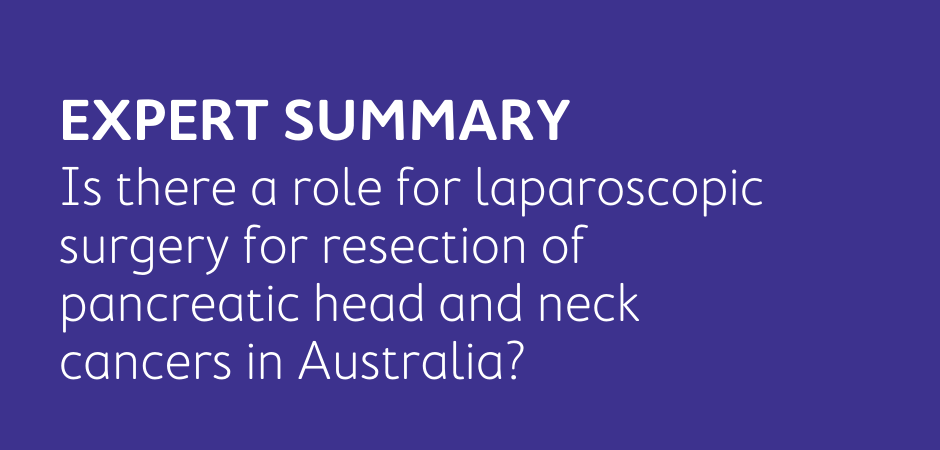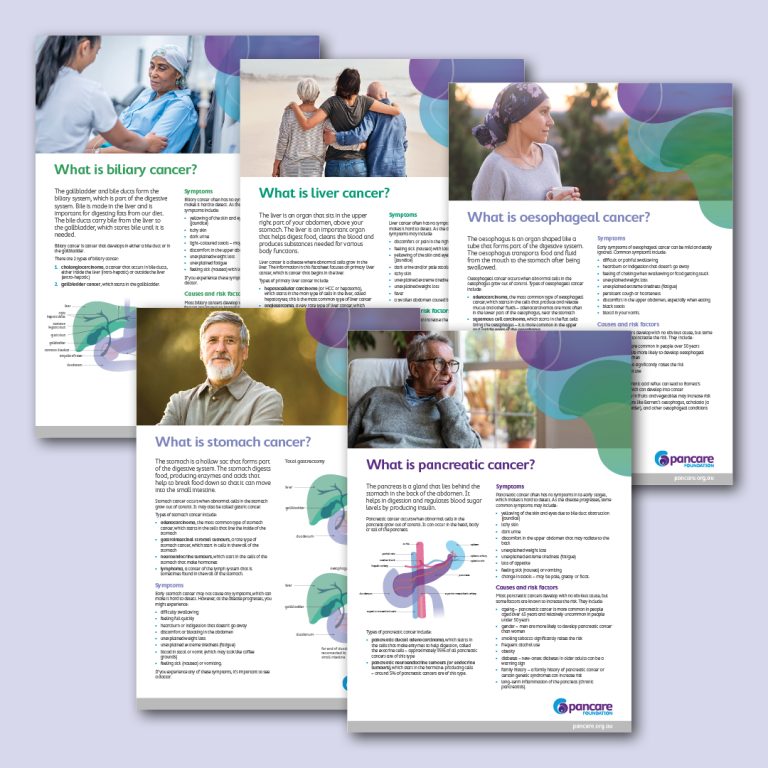
Key messages from Wang et al. Lancet Gastroenterol Hepatol 2021; 6: 438–47
- Current standard-of-care for surgery for pancreatic cancer is performed via conventional open approaches (e.g. through a large abdominal incision). Laparoscopic (or keyhole) surgery, particularly for cancers in the head and neck of the pancreas, is extremely technically complex and not performed commonly.
- This recent trial compared 300 patients undergoing laparoscopic vs. 300 patients undergoing open pancreas cancer surgery. Results showed that patients treated with keyhole surgery went home 1 day earlier postoperatively than those who underwent open surgery (15 days vs 16, respectively), and other outcomes were comparable.
- The authors concluded that the benefits of laparoscopic surgery – even if performed by high-volume surgeons experienced with this technique – could only attain clinical outcomes similar to those of open surgery.
- Currently, there is no strong evidence that laparoscopic pancreas cancer surgery is superior to open surgery for tumours in the head and neck of the pancreas.
- Laparoscopic pancreas cancer surgery should be limited to experienced surgeons at high-volume centres, and trials in this field should be done in centres where surgeons are already experts in the technique.
Discussion points from expert reviewer, A/Professor Charles Pilgrim
The current standard of care for surgical treatment of pancreas cancers in the head and neck of the pancreas as well as other tumours in the same area is surgical removal using conventional open approaches through a large abdominal incision. However, many other operations in the abdomen can be performed using the keyhole approach through smaller incisions (laparoscopic surgery).
Few surgeons are trained and capable of performing pancreas cancer surgery in this area using these laparoscopic approaches. Learning how to safely perform pancreas cancer removal requires exposure to many cases and, in fact, it has been reported that a surgeon only achieves mastery of the laparoscopic approach when they have performed over 100 surgeries of this type. More importantly, it is not even clear that there are benefits of the keyhole approach compared to open surgery for this indication.
A broad global consensus exists that laparoscopic pancreas surgery should be limited to experienced surgeons at high-volume centres, and that trials to test the benefit of laparoscopic surgery in this field should be done only in centres where surgeons are already experts in the technique.
This study recently published in the Lancet Gastroenterology and Hepatology from China (with its vastly greater population than Australia) reports on a trial undertaken over 18 months between May 2018 and December 2019 in which ultimately almost 300 patients were randomised to be treated with the laparoscopic approach and a further 300 patients randomised to be treated with the open approach to surgically remove their pancreas cancers. All surgeons involved in the study, from the 14 different centres across China specialising in this field, were already expert in the laparoscopic operation, all having done more than 100 cases personally using that approach.
Despite this highly specialised group of motivated and experienced surgeons skilled in the laparoscopic approach, the outcomes demonstrated that patients went home only one (1) day earlier with the keyhole vs. the open approach (15 days after the operation, rather than 16 days). Secondarily, there were some other mild improvements, with the keyhole group having a slightly lower rate of requiring intraoperative blood transfusion (23% vs. 31%) and slightly earlier time to first oral intake and removal of gastric decompression tube (NG tube).
There appeared to be no other differences in the quality of the surgery in terms of final pathological examination of the specimen for margin involvement or lymph node removal, nor in any specific surgical complication of bleeding or leaking from the pancreas or other structures, and no overall difference in mortality associated with the operation. Postoperative complications were seen in 50% of the laparoscopic group and 46% of the open group (not a statistically significantly different number), again highlighting the complex and challenging nature of surgery for all comers in this area.
Three other studies around the world on this topic have similarly shown a benefit in shorter length of stay, although a multicentre study was stopped early when it appeared there was a higher rate of mortality in the group having laparoscopic surgery.
Implications for Australia
There are approximately 800 new pancreas cancers diagnosed annually in the state of Victoria, with as few as 10% being eligible or appropriate for surgery. If surgeons realistically need to complete at least 100 cases before they are even considered an expert in this approach, it is doubtful this approach will be applicable to the Australian context. As the authors themselves conclude in their article,
“… in real-world settings, the benefits of [laparoscopic surgery for these pancreas cancers] are few given that, even if surgeons became high volume, they could only attain clinical outcomes that are similar to those from open [surgery].”
Given the complexity of the surgery and the relatively low numbers of operations across Australia, it is hard to envisage a situation in which a local surgeon would ever be able to safely claim they are an expert in this approach, unless they had undergone extensive training overseas previously. Additionally, the benefit of going home one day earlier (when the usual length of stay is already 15 or 16 days) is of marginal benefit.
Whilst laparoscopy has many benefits in other areas of surgery, it is yet to be definitively shown that laparoscopic resection of the pancreatic head for cancer can really improve patient outcomes sufficiently to justify the risk associated with negotiating the learning curve and embarking upon the prerequisite training requirement.
Further developments in the laparoscopic field such as the introduction of robotics improving surgical dexterity enhancing surgeon ability may affect this recommendation into the future.
About Associate Professor Charles Pilgrim, Pancare Medical Advisor

A/Prof Charles Pilgrim is a surgeon-scientist with a clinical and research focus on pancreas cancer. He works as a consultant surgeon at The Alfred and Cabrini Hospitals in Melbourne, as well as Frankston Public and Peninsula Private Hospitals on the Mornington Peninsula. He is an Associate Professor of Surgery at The Alfred, Central Clinical School, Monash University, and his main research interests are in clinical quality registries and population level outcome data for pancreas and other cancers. He chaired the 2017 and will chair the upcoming 2021 Pancreas Cancer Symposia, convened by the Victorian Government Department of Health, assessing state-wide data on pancreas cancer treatment and outcomes and is actively engaged in the Victorian Pancreas Cancer Biobank. His PhD at Peter MacCallum Cancer Centre investigated the effects of chemotherapy on the liver following which he completed a fellowship in surgical oncology for liver, bile duct and pancreas cancers at the Medical College of Wisconsin, USA. He is also an active military and trauma surgeon with the Australian Army, having deployed on operational duty to Afghanistan and Iraq.
A/Prof Charles Pilgrim is a consultant surgeon at The Alfred and Cabrini Hospitals as well as Frankston Public and Peninsula Private Hospitals in Victoria. Learn more at www.uppergiroboticsurgery.com.
Reference
Wang M, Li D, Chen R, Huang X, Li J, Liu Y, Liu J, Cheng W, Chen X, Zhao W, Li J, Tan Z, Huang H, Li D, Zhu F, Qin T, Ma J, Yu G, Zhou B, Zheng S, Tang Y, Han W, Meng L, Ke J, Feng F, Chen B, Yin X, Chen W, Ma H, Xu J, Liu Y, Lin R, Dong Y, Yu Y, Liu J, Zhang H, Qin R, on behalf of the Minimally Invasive Treatment Group in the Pancreatic Disease Branch of China’s International Exchange and Promotion Association for Medicine and Healthcare (MITG-P-CPAM). Laparoscopic versus open pancreatoduodenectomy for pancreatic or periampullary tumours: a multicentre, open-label, randomised controlled trial. Lancet Gastroenterol Hepatol 2021; 6: 438–47.
Read more . . .




